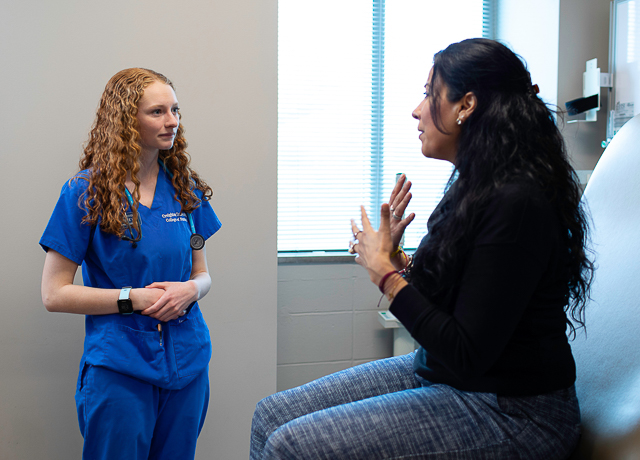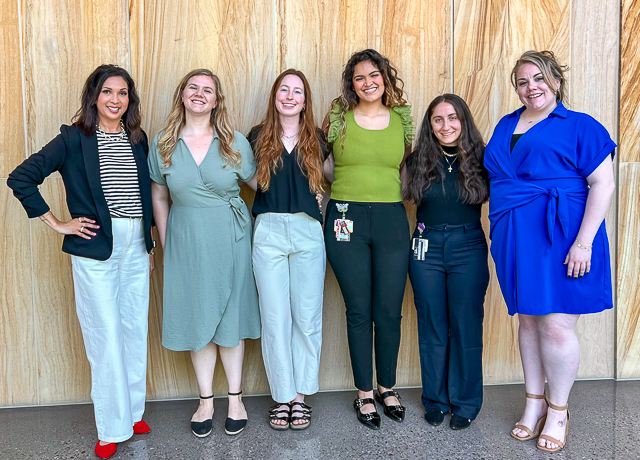Featured Testimonial About Creighton University
The Haddix Faculty Research Fund inspires and challenges Creighton’s talented researchers to think bigger, and to strive for the Magis in their contributions to science.
The Dr. George F. Haddix President’s Faculty Research Fund supports and enhances the research and scholarly productivity of full-time faculty at Creighton University. To date, 129 Haddix grants have been funded.
“The Haddix Faculty Research Fund inspires and challenges Creighton’s talented researchers to think bigger, and to strive for the Magis in their contributions to science,” said Provost Mardell Wilson, EdD, RDN.
On November 8, 12 faculty presented their work at the Dr. George F. and Susan Haddix 2022 Research Fund Awards Reception.

“The generosity of the Haddix family has had an enormous impact on the course of my work as a historian. The more I work with community members to recover their histories, the more committed I am to combining the riches of academic history with the wisdom of people’s lived experiences. This is a difficult methodology to teach in a classroom setting, so bringing students into summer research is the key to passing these methods to new generations of scholars.” Heather Fryer, PhD, retired Professor of History

“The Haddix funding enables innovative interdisciplinary research centered in community collaboration and creates an enduring legacy for Creighton’s relationship with the community. It makes me proud that we are engaged in a method of research that involves refugee women as collaborators, that honors their stories in their voices, without pre-existing frameworks. As one of our interviewees put it, ‘I want to tell you. You see me; you hear me when I talk.’” Surbhi Malik, PhD, Associate Professor of English

“We are incredibly grateful to Dr. and Mrs. Haddix. Their support will make a significant impact on our understanding of the barriers aging Nebraskans face in discussing and documenting their wishes for end-of-life care.

"In partnering with CHI’s Faith Community Health Network and faculty across campus, we hope to create an interprofessional advance care planning intervention that will prepare health professional, business, and law students for these crucial conversations while addressing the needs of an aging population.” Mandy Kirkpatrick, PhD, RN, Associate Professor of Nursing & Meghan Potthoff PhD, APRN-NP, Associate Professor of Nursing

“Sharing my faith and working for a better world have always motivated me in my teaching, scholarship, and research. I believe that this dimension of life gives meaning to all that we do, in whatever profession we find ourselves. We are blessed to be able to share this gift with our students and colleagues. I hope my work supports this perspective and provides students with a grammar for being people for and with others.” Thomas M. Kelly, PhD, Professor of Theology

“The Haddix Fund helped us to start an interdisciplinary team – Culturally Effective Care (CEC) Lab – comprised of experts in occupational therapy, physical therapy, and health services research, as well as a community partner and racial-ethnic minority health professions students. Mentoring racial-ethnic minority health care professions students has been exceptionally rewarding. From the CEC Lab, we want to produce high quality research that can capture and elevate the voice, presence, and realities of racial-ethnic minority families whose children receive rehabilitation services.” Julia Shin, EdD, Assistant Professor of Occupational Therapy

“The Dr. George Haddix Faculty Research Fund has been key in allowing my lab to enter a new field of research – understanding the basic biology of Naegleria species – one of which causes a fatal disease in humans commonly referred to as the ‘brain-eating amoeba.’ The long-term goal of our studies is to identify preexisting drugs that can be repurposed to treat this almost universally fatal infection. The Haddix fund has also helped support the work of two graduate students and two undergraduates. I am grateful to Dr. Haddix for his support of my research. This project would not have gained the momentum it has without this funding." Kristen Drescher, PhD, Professor of Medical Microbiology and Immunology


